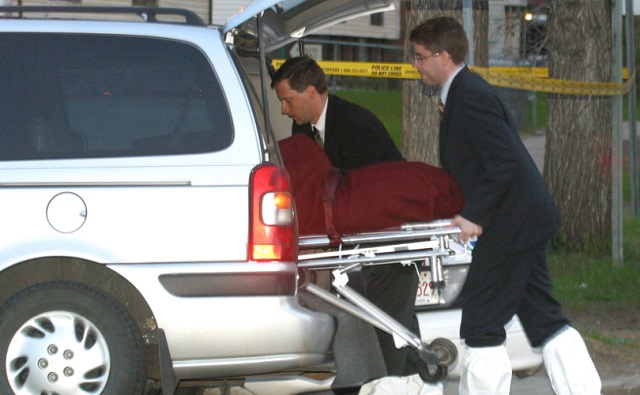Crime
Canada’s justice system struggling to fight crime amid highest murder rate in 30 years: report

From LifeSiteNews
Canada’s murder rate has increased every year from 2018 to 2022, including by 8% from 2021 to 2022, and the police-reported rate for sexual assault is at its highest level since 1995, research indicates.
A well-known Ottawa think tank warned in a recent report on crime that Canada’s justice system is unable to keep up with out-of-control crime that has risen sharply in the last few decades to the point where the national murder rate at its highest in 30 years.
According to the Macdonald-Laurier Institute’s “Report on the Criminal Justice System” released last month, Canada’s violent crime severity is at its highest level since 2007.
“Canada’s criminal justice system is clearly performing worse than it was six years ago,” the report concluded. “There remains a need for ongoing independent monitoring and performance measurement of the criminal justice system in Canada.”
In 2021, the violent crime rate increased by 6%. In 2022, the rate went up another 5%.
According to researchers, Canada’s murder rate has increased “every year” from 2018 to 2022, “including by 8% from 2021 to 2022.”
“The current homicide rate is the highest it has been in 30 years, and the police-reported rate for sexual assault is at its highest level since 1995,” researchers described.
The Institute’s report card on crime in Canada goes through each province and territory, noting that every level of government “bears a portion of the costs of criminality and each level of government therefore has an interest in its suppression.”
Since 2017, when the last report card was released, some provinces have done better and others have gotten worse. For example, Alberta’s overall positive ranking has gone up (less crime) and Ontario’s has gone down (more crime). The provinces with the most violent crime in terms of rates per population were Saskatchewan and Manitoba.
The report found that violent crime in the last five years went up overall, with the “proportion of “Canadians who express confidence in the fairness of the criminal justice system is troublingly low.”
“In 2022, only 62% of Canadians expressed confidence in the police, with only 46% expressing confidence in the justice system more broadly,” the report states.
The report also noted that confidence in “police and the justice system are worryingly low.”
“And no wonder: The combination of plunging clearance rates and an increasing number of cases stayed or gives the perception of a justice system that has given up on its core responsibilities,” according to the report, which also noted that one of the biggest issues “with fairness in Canada’s criminal justice system is the overrepresentation of Indigenous peoples in incarceration.”
“Since 1995, the Criminal Code of Canada has required courts to consider all available sanctions other than imprisonment, especially when it comes to Indigenous offenders.”
It should be noted that Canada’s Supreme Court said in 2012 that lower courts must “must take judicial notice” of the history of “colonialism, displacement, and residential schools” when sentencing Indigenous people.
However, the reality is that Indigenous people jailed for committing crimes is extremely high proportionally in western Canada and Ontario.
When it comes to the overall justice system in Canada, it scored low in terms of efficiency.
“The percentage of cases stayed or withdrawn increased in every single province and territory since 2017, as has the median criminal case length,” the report noted.
Also, crimes have been solved at a lower rate in 2023 compared with previous years, as more cases were stayed or withdrawn.
“Our criminal justice system has unquestionably become less efficient over the last five years despite the introduction of measures designed to enhance the expedient dispensation of justice,” the report states.
“For the most part, the story is not a positive one. On all five of the broad criminal justice objectives, the system is not performing as most would hope, and the situation appears to be deteriorating,” the report concluded.
Crime on the rise in Canada under Trudeau
In 2019, Prime Minister Justin Trudeau’s government passed Bill C-75, which in effect created a “catch and release bail system,” according to pundits and the opposition Conservative Party.
As a result, Canada has seen in recent years a sharp increase in auto thefts from organized crime groups, who have taken advantage of weak sentencing for those caught committing theft.
Conservative Party leader Pierre Poilievre recently blasted Trudeau for the rise in auto theft, blaming his soft stance on criminals.
“After eight years of Justin Trudeau, car thefts are up 300% in Toronto and 100% in Ottawa and Montreal. Nationally, car thefts are up by more than a third since his Liberal government took office,” Poilievre said.
Last week, Poilievre promised that a Conservative government would “go after the real criminals by restoring jail not bail for repeat violent offenders and career car thieves.”
“It’s not the courts that have turned loose criminals and allowed this crime wave, it’s Justin Trudeau. It was not the courts that passed C-75, the catch and release bail system, it was Justin Trudeau. It was not the courts that brought in house arrest for repeat car thieves in C-5, it was Justin Trudeau,” Poilievre said.
Last week, LifeSiteNews reported that Statistics Canada data shows most violent gun crimes in the country last year were not committed at the hands of legal gun owners but by those who obtained the weapons illegally. This comes despite the federal government cracking down on legal gun owners.
Crime against Christian churches has risen sharply in the past two years, with approximately 100 churches to date having been set on fire or vandalized, with almost no arrests made. That fact has prompted Poilievre to call out Trudeau for being silent on the church burnings.
Addictions
Why can’t we just say no?

From the Frontier Centre for Public Policy
Drug use and violence have become common place in hospitals. Drug-addicted patients openly smoke meth and fentanyl, and inject heroin. Dealers traffic illicit drugs. Nurses are harassed, forced to work amidst the toxic fumes from drugs and can’t confiscate weapons. In short, according to one nurse, “We’ve absolutely lost control.”
“Defining deviancy down” is a cultural philosophy that emerged in the United States during the 1990s.
It refers to society’s tendency to adjust its standards of deviancy “down,” so that behaviours which were once unacceptable become acceptable. Over time, this newly- acceptable behaviour can even become society’s norm.
Of course, the converse must also be true — society looks down on those who label social behaviours “wrong,” deeming them moralistic, judgemental or simply out of touch with the realities of modern life.
Thirty years later, this philosophy is entrenched in British Columbia politics and policies. The province has become a society that cannot say “no” to harmful or wrong behaviours related to drug use. It doesn’t matter if you view drug use as a medical issue, a law-and-order issue, or both – we have lost the ability to simply say “no” to harmful or wrong behaviour.
That much has become abundantly clear over the past two weeks as evidence mounts that BC’s experiment with decriminalization and safe supply of hard drugs is only making things worse.
A recently-leaked memo from BC’s Northern Health Authority shows the deleterious impact these measures have had on BC’s hospitals.
The memo instructs staff at the region’s hospitals to tolerate and not intervene with illegal drug use by patients. Apparently, staff should not be taking away any drugs or personal items like a knife or other weapons under four inches long. Staff cannot restrict visitors even if they are openly bringing illicit drugs into the hospital and conducting their drug transactions in the hallways.
The public was quite rightly outraged at the news and BC’s Health Minister Adrian Dix quickly attempted to contain the mess by saying that the memo was outdated and poorly worded.
But his facile excuses were quickly exposed by publication of the very clearly worded memo and by nurses from across the province who came forward to tell their stories of what is really happening in our hospitals.
The President of the BC Nurses Union, Adriane Gear, said the issue was “widespread” and “of significant magnitude.” She commented that the problems in hospitals spiked once the province decriminalized drugs. In a telling quote, she said, “Before there would be behaviours that just wouldn’t be tolerated, whereas now, because of decriminalization, it is being tolerated.”
Other nurses said the problem wasn’t limited to the Northern Health Authority. They came forward (both anonymously and openly) to say that drug use and violence have become common place in hospitals. Drug-addicted patients openly smoke meth and fentanyl, and inject heroin. Dealers traffic illicit drugs. Nurses are harassed, forced to work amidst the toxic fumes from drugs and can’t confiscate weapons. In short, according to one nurse, “We’ve absolutely lost control.”
People think that drug policies have no impact on those outside of drug circles – but what about those who have to share a room with a drug-smoking patient?
No wonder healthcare workers are demoralized and leaving in droves. Maybe it isn’t just related to the chaos of Covid.
The shibboleth of decriminalization faced further damage when Fiona Wilson, the deputy chief of Vancouver’s Police Department, testified before a federal Parliamentary committee to say that the policy has been a failure. There have been more negative impacts than positive, and no decreases in overdose deaths or the overdose rate. (If such data emerged from any other healthcare experiment, it would immediately be shut down).
Wison also confirmed that safe supply drugs are being re-directed to illegal markets and now account for 50% of safe supply drugs that are seized. Her words echoed those of BC’s nurses when she told the committee that the police, “have absolutely no authority to address the problem of drug use.”
Once Premier David Eby and Health Minister Adrian Dix stopped denying that drug use was occurring in hospitals, they continued their laissez-faire approach to illegal drugs with a plan to create “safe consumption sites” at hospitals. When that lacked public appeal, Mr. Dix said the province would establish a task force to study the issue.
What exactly needs to be studied?
The NDP government appears to be uninformed, at best, and dishonest, at worst. It has backed itself into a corner and is now taking frantic and even ludicrous steps to legitimize its experimental policy of decriminalization. The realities that show it is not working and is creating harm towards others and toward institutions that should be a haven for healing.
How quickly we have become a society that lacks the moral will – and the moral credibility – to just to say “no.”
Susan Martinuk is a Senior Fellow with the Frontier Centre for Public Policy and author of Patients at Risk: Exposing Canada’s Health-care Crisis.
Alberta
Former senior financial advisor charged with embezzling millions from Red Deer area residents

News release from Alberta RCMP
Former senior financial advisor charged for misappropriating nearly $5 million from clients
On April 4, 2024, the RCMP’s Provincial Financial Crime Team charged a Calgary resident for fraud-related offences after embezzling millions of dollars from his clients while serving as a senior financial advisor.
Following a thorough investigation, the accused is alleged to have fraudulently withdrawn funds from client accounts and deposited them into bank accounts he personally controlled. A total of sixteen victims were identified in the Red Deer area and suffered a combined loss of nearly $5 million.
Marc St. Pierre, 52, a resident of Calgary, was arrested and charged with:
- Fraud over $5,000 contrary to section 380(1)(a) of the Criminal Code; and,
- Theft over $5,000 contrary to section 344(a) of the Criminal Code.
St. Pierre is scheduled to appear in Red Deer Provincial Court on May 14, 2024.
“The ability for financial advisors to leverage their position to conduct frauds and investment scams represents a significant risk to the integrity of Alberta’s financial institutions. The investigation serves as an important reminder for all banking clients to regularly check their accounts for any suspicious activity and to report it to their bank’s fraud prevention team.”
- Sgt. John Lamming, Provincial Financial Crime Team
The Provincial Financial Crime Team is a specialized unit that conducts investigations relating to multi-jurisdictional serious fraud, investments scams and corruption.
-

 Business2 days ago
Business2 days agoUN plastics plans are unscientific and unrealistic
-

 Business2 days ago
Business2 days agoTaxpayers criticize Trudeau and Ford for Honda deal
-

 Fraser Institute2 days ago
Fraser Institute2 days agoCanadians should decide what to do with their money—not politicians and bureaucrats
-

 Addictions2 days ago
Addictions2 days agoBritish Columbia should allow addicts to possess even more drugs, federal report suggests
-

 Censorship Industrial Complex1 day ago
Censorship Industrial Complex1 day agoJordan Peterson, Canadian lawyer warn of ‘totalitarian’ impact of Trudeau’s ‘Online Harms’ bill
-

 Alberta2 days ago
Alberta2 days agoAlberta rejects unconstitutional cap on plastic production
-

 Censorship Industrial Complex2 days ago
Censorship Industrial Complex2 days agoAustralian politicians attack Elon Musk for refusing to remove video of Orthodox bishop’s stabbing
-

 Alberta2 days ago
Alberta2 days agoAlberta official reveals ‘almost all’ wildfires in province this year have been started by humans








